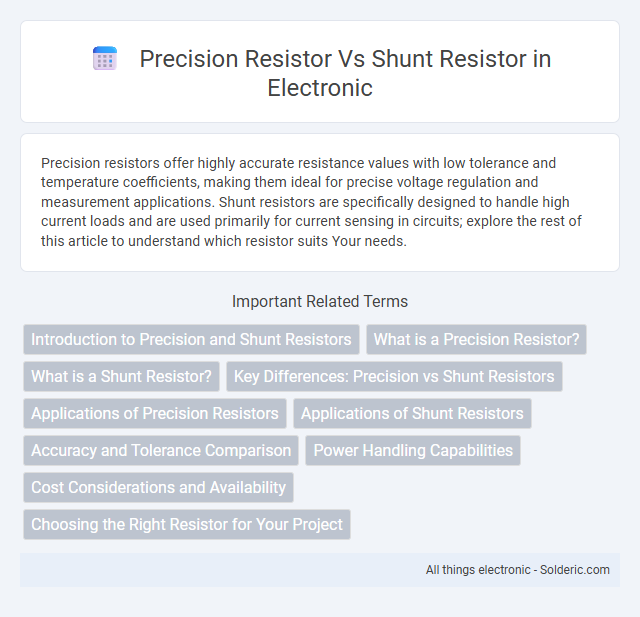Precision resistors offer highly accurate resistance values with low tolerance and temperature coefficients, making them ideal for precise voltage regulation and measurement applications. Shunt resistors are specifically designed to handle high current loads and are used primarily for current sensing in circuits; explore the rest of this article to understand which resistor suits Your needs.
Comparison Table
| Feature | Precision Resistor | Shunt Resistor |
|---|---|---|
| Purpose | Accurate voltage division and current control | Current measurement by voltage drop |
| Accuracy | High accuracy (+-0.01% to +-0.1%) | Moderate to high accuracy, optimized for low resistance |
| Resistance Range | Typically from ohms to megaohms | Very low resistance (mO range) |
| Power Rating | Low to medium power | High power dissipation capability |
| Temperature Coefficient | Low TCR (ppm/degC) | Very low TCR for stability |
| Applications | Precision circuits, voltage dividers, calibration | Current sensing in power supplies, batteries, and motor control |
| Material | Metal film, metal oxide, wirewound | Metal strip, metal foil |
| Cost | Higher due to precision manufacturing | Lower, cost-effective for current sensing |
Introduction to Precision and Shunt Resistors
Precision resistors offer highly accurate resistance values with tight tolerance levels, making them ideal for applications requiring exact measurements and consistent performance. Shunt resistors, designed to carry high current loads with low resistance, are primarily used for current sensing and power management in electronic circuits. Your choice between a precision resistor or a shunt resistor depends on whether the priority is precise voltage control or efficient current measurement.
What is a Precision Resistor?
A precision resistor is a high-accuracy electronic component specifically designed to provide exact resistance values with minimal tolerance, typically within +-0.1% or better. These resistors ensure stable performance under varying environmental conditions, maintaining consistent resistance over time and temperature changes. Precision resistors are essential in applications requiring accurate voltage division, current sensing, and signal conditioning, where precise resistance directly impacts circuit performance.
What is a Shunt Resistor?
A shunt resistor is a low-value resistor used to measure electric current by producing a small, proportional voltage drop. It is designed to handle high current flow with minimal power loss and heat generation, ensuring accurate current sensing. Unlike precision resistors that prioritize exact resistance values, shunt resistors emphasize current measurement applications in circuits like battery management and power monitoring.
Key Differences: Precision vs Shunt Resistors
Precision resistors offer high accuracy and stability for precise voltage division and current sensing, with tolerance typically as low as 0.01%. Shunt resistors, designed to handle high current, provide a low-resistance path to measure current by detecting voltage drop with minimal power loss. Your choice depends on application requirements: precision resistors excel in accuracy-sensitive circuits, while shunt resistors are ideal for robust current measurement tasks.
Applications of Precision Resistors
Precision resistors are essential in applications requiring accurate voltage division, current sensing, and signal conditioning, such as in instrumentation amplifiers and digital multimeters. Their tight tolerance and low temperature coefficient ensure reliable performance in calibration circuits and aerospace systems. Precision resistors improve measurement accuracy in medical devices and precision power supplies by minimizing errors caused by resistance fluctuations.
Applications of Shunt Resistors
Shunt resistors are widely used in current sensing applications due to their ability to provide accurate voltage drop measurements proportional to current flow, making them essential in power management and battery monitoring. These resistors are commonly found in automotive systems, power supplies, and industrial equipment to measure high currents with minimal power loss. Your choice of a shunt resistor ensures precise current measurement critical for protecting circuits and optimizing performance.
Accuracy and Tolerance Comparison
Precision resistors exhibit superior accuracy with tolerance ratings often as low as +-0.01%, making them ideal for applications requiring exact resistance values. Shunt resistors typically have higher tolerance ranges, commonly between +-1% and +-5%, which can impact measurement precision in sensitive circuits. The tight tolerance of precision resistors ensures consistent performance and minimal resistance variation over temperature changes, whereas shunt resistors prioritize low resistance and power dissipation with less stringent accuracy demands.
Power Handling Capabilities
Precision resistors typically handle lower power levels, often rated between 0.1W to 1W, due to their focus on accuracy and stability in measurement applications. Shunt resistors are designed for high power dissipation, commonly ranging from 5W to over 100W, as they need to measure large currents by dropping minimal voltage without overheating. The superior power handling capabilities of shunt resistors make them ideal for current sensing in power electronics and battery management systems.
Cost Considerations and Availability
Precision resistors typically have higher costs due to tighter tolerances and superior stability, making them ideal for applications requiring exact resistance values. Shunt resistors are generally more affordable and widely available, as they are designed primarily for current sensing rather than precision voltage control. Availability of precision resistors can be limited in high-power ratings and specific resistance values compared to the broad range of shunt resistors found in the market.
Choosing the Right Resistor for Your Project
Choosing the right resistor for your project depends on accuracy, power rating, and application requirements; precision resistors offer tight tolerance and low temperature coefficients, ideal for circuit calibration and measurement applications. Shunt resistors, designed for current sensing, provide low resistance values with high power dissipation capacity, making them suitable for monitoring high current flows. Understanding these differences ensures optimal performance, accuracy, and reliability in your electronic designs.
precision resistor vs shunt resistor Infographic

 solderic.com
solderic.com